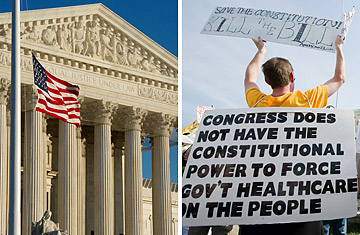
A Tea Party supporter, right, demonstrates in Washington on March 21, 2010, against health care reform, which the Supreme Court, left, may rule on
A Florida federal judge ruled Monday that Congress overstepped its authority when it passed last year's Affordable Care Act, providing the most serious challenge yet to President Obama's signature legislative accomplishment. Attorneys for the 26 states that brought the suit said Monday that the decision gives those states grounds to ignore the law, though the Obama Administration disagrees and has vowed to appeal. The latest salvos all but guarantee that the Supreme Court will step in to decide whether the law is constitutional, now that two federal judges have ruled in favor of the legislation and, counting the Florida decision, two have ruled against it.
But as those challenges snake their way up through the courts, more than just health care reform is at stake. If successful, the suits could end up rejiggering the delicate balance between the federal government and the states, and could profoundly redefine the limits of congressional power.
The legislation at issue, and in particular its requirement that all Americans buy health insurance, is rooted in the power granted to Congress by the commerce clause of the Constitution. That's the bit of language in Article I that says Congress has the power to "regulate commerce with foreign nations, and among the several states, and with the Indian tribes."
For most of the past 100 years, the Supreme Court has interpreted those few words broadly, using them to uphold some of Congress's most progressive pieces of legislation, from Depression-era farm quotas to bans on racial discrimination in the 1960s. But when Senate Democrats included the so-called individual mandate in the health care reform bill last year, some Republicans objected immediately, arguing that the law simply exceeds Congress's authority.
Constitutional-law scholar Randy E. Barnett of Georgetown University Law Center said the mandate is unique in federal law. "Never before in American history has the commerce clause been used to impose a mandate on all Americans to enter into a commercial relationship with a private company," Barnett told a crowd of constitutional-law professors at a panel discussion of the individual mandate in August. "Up until today, all previous exercises of the commerce power had been to regulate activity or to prohibit certain activity."
He has plenty of company. Attorneys general from more than 20 states and other plaintiffs wasted no time in suing to stop the bill, and to especially strip from it the individual mandate. The Florida case was filed "within minutes" of President Obama signing the law, the judge noted in his opinion Monday. The Obama Administration won the first two rounds, when two federal judges dismissed challenges to the bill, though those decisions have been appealed. Then, in December, U.S. District Judge Henry Hudson in Virginia agreed with the critics and ruled the mandate unconstitutional on exactly the grounds that Republicans had based their objections. Monday's ruling by U.S. District Judge Roger Vinson went much further, striking down the entire law.
Once the cases reach the high court, they will offer Chief Justice John Roberts his first chance to put his stamp on an area of law on which his predecessor left lasting marks. Fifteen years ago, Chief Justice William Rehnquist authored the first opinion in nearly a century striking down an act of Congress on the grounds that lawmakers had exceeded the powers granted under the commerce clause. In U.S. v. Lopez — a decision Vinson on Monday called a "watershed" moment — the court invalidated a federal statute that made it illegal to possess a firearm near a school. In passing the law, Congress had reasoned it would easily fall within the 20th century court's understanding of the commerce clause giving Congress the power to regulate anything that had a "substantial effect" on interstate commerce, no matter how far removed from the actual selling and transporting of goods it might be.
